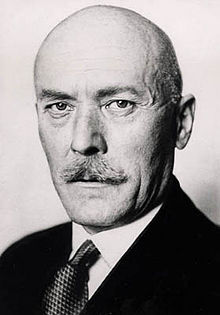Friedrich Werner von der Schulenburg
| Friedrich Werner von der Schulenburg | |
|---|---|
 |
|
| Born |
20 November 1875 Kemberg, German Empire |
| Died | 10 November 1944 (aged 68) Berlin, Plötzensee Prison |
| Nationality | German |
| Occupation | Diplomat |
| Spouse(s) | Elisabeth von Sobbe (1908 - 1910) |
| Children | Christa-Wernfriedis von der Schulenburg |
Friedrich-Werner Graf von der Schulenburg (20 November 1875 – 10 November 1944) was an early Nazi supporter and German diplomat who served as the last German ambassador to the Soviet Union before Operation Barbarossa. He began his diplomatic career before World War I, serving as consul and ambassador in several countries. He turned against the main Nazi Party and joined the conspiracy against Hitler. After the failed 20 July plot in 1944, Schulenburg was accused of being a co-conspirator and eventually executed.
He was a Knight of Justice of the Order of St John, which was regarded with disfavour by the Nazis.
Schulenburg was born in Kemberg, Saxony-Anhalt, to Graf Bernhard von der Schulenburg. After one year serving in the army, he studied law in Lausanne, Munich, and Berlin, and in 1901 joined the Foreign Office's consular service as a junior civil servant (Assessor). By 1903, he had been appointed as vice-consul at Germany's consulate general in Barcelona, and in the years that followed he found himself working at consulates in Lvov, Prague, Warsaw, and Tbilisi. With the outbreak of the First World War in 1914, Schulenburg returned to the military, and after the First Battle of the Marne was promoted to captain in October 1914 and put in charge of an artillery battery. In 1915, he was posted as German liaison officer to the Ottoman Army on the Armenian Front. In 1916, he took over the command of the Georgian Legion in the struggle against the Russian Empire, until its collapse in 1917. During his time in the military, he received the Iron Cross and some high Ottoman honours. After the German Empire's collapse, he was captured by the British and interned on the Mediterranean island of Prinkipo (now called Büyük Ada), returning to Germany in 1919. Schulenburg was then reinstated in the Foreign Office Service and became German consul in Beirut.
...
Wikipedia
